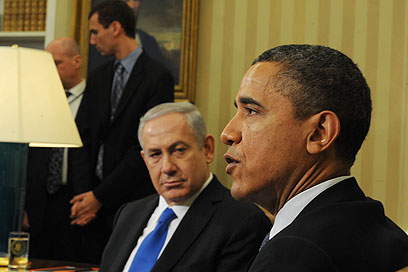
Netanyahu's 2011 Congress address. 'The important consensus towards Israel has been broken'
צילום: רויטרס
Israel could pay a price for Netanyahu's Congress speech
Analysis: If prime minister's US visit does help him win elections, he may find an even more hostile and critical president in the White House. Without America's support, Israel will be unable to deal with European and Palestinian challenges lying ahead.
Prime Minister Benjamin Netanyahu's invitation to address the US Congress on the negotiations with Iran has led to another serious incident in relationship between the United States and Israel.

The House of Representatives speaker, John Boehner, could have informed the White House of his intention to invite Netanyahu and consult the president on the most appropriate timing. He chose to make a one-sided, factional move in order to demonstrate the Republican Congress' willingness to confront the president, on foreign policy issues as well.
President Barack Obama feels there is no real concern for Israel here, but a maneuver concocted by the Republicans and Netanyahu in a bid to challenge Obama's status, make it difficult for him to negotiate with Iran and help Netanyahu with the elections in Israel.
The relations between the Republican Congress and the Democratic president are murky and poisonous. In his State of the Union address last week, Obama threatened to veto laws he doesn’t approve of in the Congress, both in regards to domestic issues and in regards to the talks with Iran.
Most Republicans and quite a few Democrats think, like Netanyahu, that Obama is leading to a bad agreement which will enable Iran to become a nuclear power. They want to enact additional serious sanctions if the talks fail. Obama believes that imposing such sanctions, even future sanctions, will destroy the negotiations.

Obama and Netanyahu. 'The US president has no reason to give in to what appears to be a Republican dictation and a speech which will criticize his policy on Iran and could help the Israeli leader win the elections' (Photo: Amos Ben Gershom, GPO) (צילום: עמוס בן גרשום, לע"מ)
The Republicans invited Netanyahu in order to pressure Obama, but there isn't much use in this pressure. In order to overcome a presidential veto, there is a need for a repeated vote of two-thirds of the Congress members. The Republicans don’t have a majority of 67 senators which can overcome an Obama veto on Iran. So the talks about the Congress' ability to force the president to change his policy are baseless. On the other hand, factional moves could cause the Democrats who do support the Israeli stance to withdraw and express their solidarity with Obama.
Israel always enjoyed both US parties' support. This changed during the Obama years. Surveys have revealed that the Republicans support Israel much more than the Democrats: 80% of Republicans compared to 65% of Democrats see Israel in a positive light, 81% compared to 56% support Israel in the conflict with the Palestinians, 50% compared to 25% have a positive attitude towards Netanyahu, and 65% of Republicans supported Israel during Operation Protective Edge compared to only 31% of the Democrats.
The important consensus between the two parties has been broken. Israel should have made a special effort to restore the Democrats' support to the high level of the past and bring it closer to the Republican support. The Congress invitation and Obama's refusal to meet with Netanyahu are operating in the opposite direction and could intensify the polarity between the two parties towards Israel even more.
Obama's refusal to meet with Netanyahu was expected. He has no reason to give in to what appears to be a Republican dictation and a speech which will criticize his policy on Iran and could help Netanyahu win the elections. He would rather work with a new government led by Isaac Herzog and Tzipi Livni, from whom he expects much more flexibility in the talks with the Palestinians.
The opposition in Israel could argue that Obama and Secretary of State John Kerry's refusal to meet Netanyahu is further proof of his inability to sustain close vital relations with the US, and that that is one of the reasons he should be replaced.
If the visit does help Netanyahu win, it will be a Pyrrhic victory. He may find an even more hostile and critical president in the White House who will not want to see him until the end of his term. Without America's support, Israel will be unable to deal with the European and Palestinian challenges closing in on the Jewish state.
Prof. Eytan Gilboa is the director of the Center for International Communication at Bar-Ilan University and a senior research fellow at the Begin-Sadat Center for Strategic Studies.










